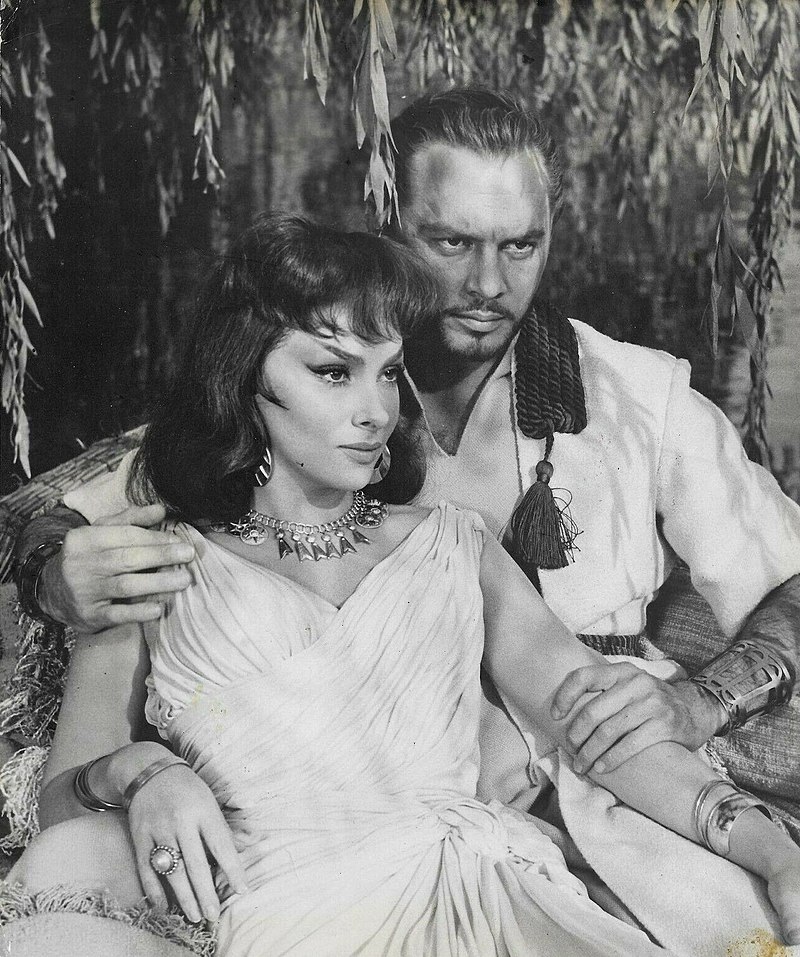Solomon and Sheba (1959) starring Yul Brynner, Gina Lollobrigida, George Sanders
Solomon and Sheba stars Yul Brinner, Gina Lollobrigida, George Sanders in an un-Biblical Biblical epic, that’s enjoyable fluff
Review | Cast | Quotes | Trivia

Review of Solomon and Sheba
What can I say? Yul Brynner with hair! Italian Gina Lollobrigida as the Nubian Queen of Sheba! Prince Adonijah (George Sanders) plotting to steal the throne of Solomon (Yul Brinner)! The Queen of Sheba acting as an agent of the Egyptian Pharaoh to destroy King Solomon!
In short: the Biblical text is mostly thrown out the window. Solomon and Sheba is grossly inaccurate, but the acting’s decent. It’s in the book The Fifty Worst Films of All Time for good reason.
Cast of characters
- Yul Brynner (Anastasia) as King Solomon. David’s successor, the third king of Israel. A man who is led astray from the God of Israel by the Queen of Sheba. In the film, he goes so far as to allow a pagan orgy in praise of one of her false gods to occur in Israel.
- Gina Lollobrigida as Queen of Sheba. The beautiful, intelligent, scheming Queen. Here, she’s an agent of Pharaoh, sent to undermine Solomon. At the end of the film, she returns to Sheba. Pregnant with Solomon’s child.
- George Sanders (Village of the Damned) as Adonijah. Another of David’s sons, who feels that he should have been king. In the Biblical story, he was put to death shortly after Solomon’s ascent to the throne.
- David Farrar as Pharaoh. In the film, the power behind the attempt to unseat Solomon, and replace him with his brother Adonijah.
- John Crawford as Joab, commander of Israel’s army.
- Finlay Currie (Ben-Hur) as King David
- William Devlin (Blood Of The Vampire) as Nathan the prophet. Biblically, sent by God to confront King David about his adultery and murder. Here, he disowns Solomon after the pagan orgy, and God’s divine punishment.
Movie quotes from Solomon and Sheba
Adonijah (George Sanders): You and your Sheban slut have defiled the fair name of Israel.
Pharaoh (David Farrar): And how will you destroy Solomon?
Sheba (Gina Lollobrigida): It is said that Solomon is wise. But no matter how wise he may be, he is still human, with a human weakness.
Pharaoh (David Farrar): Surely the way of a woman is beyond understanding.
Sheba (Gina Lollobrigida): The way of a woman is simple, my lord. It is always to follow the way of a man.
Abishag (Marisa Pavan): How interesting your encampment is. Are your people always so carefree and gay?
Sheba (Gina Lollobrigida): We enjoy life and pleasure. Don’t you?
Abishag (Marisa Pavan): Oh yes, we do. But we are … an austere people. We tend to be more serious.
Sheba (Gina Lollobrigida): And your king … is he also serious?
Abishag (Marisa Pavan): King Solomon has a great responsibility.
Solomon (Yul Brinner): Nothing must come between us.
Sheba (Gina Lollobrigida): Not even our gods? I knew this moment would come, for the things we believe in are not the same.
Solomon (Yul Brinner): I had hoped that in time you would come to accept Jehovah.
Sheba (Gina Lollobrigida): As King of Israel, would you abandon the god of your people for mine?
Solomon (Yul Brinner): Still, I dared hope.
Elder: I charge you, Solomon, to cleanse yourself of this iniquity you have permitted to spawn in Israel.
Another elder: Abjure this woman and her idolatries. Tear down the obscene abomination she has erected!
Trivia for Solomon and Sheba
- Co-producer/star Tyrone Power had completed shooting more than half of the film when he collapsed during a dueling scene with George Sanders and died a few minutes later. Power was replaced in the role of Solomon by Yul Brynner, who refilmed all of Power’s scenes. Power, however, is still visible in the film in long shots.
- One of the films included in “The Fifty Worst Films of All Time (and how they got that way)” by Harry Medved and Randy Lowell.
- The film makes heavy use of the Star of David as Solomon’s symbol. It is seen on the shields of Solomon’s army, and on articles of clothing worn by Solomon and members of his court. However, the Star of David did not appear in Jewish literature until the 12th Century A.D., and did not become a Jewish symbol until the 17th century.
- Several characters refer to God as “Jehovah,” which is the Latin name for God. “Yahweh” is the Hebrew name.
- The Ark of the Covenant is shown without the poles to carry it. “The poles shall remain in the rings of the ark; they shall not be removed from it”.-Exodus 25:15
- The temple was never destroyed by lightning.